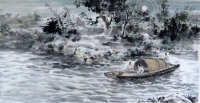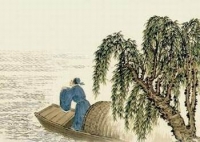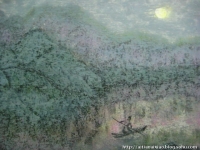| 多首一页 |
春泛若耶溪
A BOAT IN SPRING ON RUOYA LAKE
綦毋潜
晚风吹行舟,花路入溪口。
际夜转西壑,隔山望南斗。
潭烟飞溶溶,林月低向后。
生事且弥漫,愿为持竿叟。
【白话文】 归隐之心长期以来不曾中断,此次泛舟随遇而安任其自然。
阵阵晚风吹着小舟轻轻荡漾,一路春花撒满了溪口的两岸。
傍晚时分船儿转出西山幽谷,隔山望见了南斗明亮的闪光。
水潭烟雾升腾一片白白茫茫,岸树明月往后与船行走逆向。
人间世事多么繁复多么茫然,愿作渔翁持竿垂钓在此溪旁!
【注释】 1. 际夜:至夜。
2. 潭烟:水气。
3. 弥漫:渺茫。
【赏析】 这首五言古体诗大约是诗人归隐后的作品。若耶溪在今浙江绍兴市东南,相传为西施浣纱处,水清如镜,照映众山倒影,窥之如画。诗人在一个春江花月之夜,泛舟溪上,自然会滋生出无限幽美的情趣。
开篇“幽意无断绝”句,以“幽意”二字透露了全诗的主旨,即幽居独处,不与世事,放任自适的意趣。这种“幽意”支配着他的人生,不曾“断绝”,因此,他这次出游只是轻舟荡漾,任其自然,故云“此去随所偶”。“偶”即“遇”。诗人在这里流露出一种随遇而安的情绪。
以下写泛舟的时间和路线,描写沿岸景物。“晚风吹行舟,花路入溪口”,习习晚风,吹拂着游船,船儿任凭轻风吹送,转入春花夹岸的溪口,恍如进了武陵桃源胜境,多么清幽,多么闲适!“晚”字点明泛舟的时间,“花”字切合题中的“春”,看似信笔写来,却又显得用心细致。“际夜转西壑,隔山望南斗”,写出游程中时间的推移和景致的转换。“际夜”,是到了夜晚,说明泛舟时间之久,正是“幽意无断绝”的具体写照。“西壑”,是舟行所至的另一境地,当置身新境,心旷神怡之时,抬头遥望南天斗宿,不觉已经“隔山”了。
“潭烟飞溶溶,林月低向后”二句,是用淡墨描绘的如画夜景。“潭烟”,是溪上的水雾;“溶溶”,是夜月之下雾气朦腾的景状,而着一“飞”字,把水色的闪耀,雾气的飘流,月光的洒泻,都写活了,“林月低向后”,照应“际夜”,夜深月沉,舟行向前,两岸树木伴着月亮悄悄地退向身后。这景象是美的,又是静的。
诗人以春江、月夜、花路、扁舟等景物,创造了一种幽美、寂静而又迷蒙的意境。而怀着隐居“幽意”的泛舟人,置身于这种境界之中,此刻有何感受呢?“生事且弥漫,愿为持竿叟”,啊,人生世事正如溪水上弥漫无边的烟雾,缥缈迷茫,我愿永作若耶溪边一位持竿而钓的隐者。“持竿叟”,又应附近地域的严子陵富春江隐居垂钓的故实,表明诗人心迹。末二句抒发感慨极其自然,由夜景的清雅更觉世事的嚣嚣,便自然地追慕“幽意”的人生。
殷璠说綦毋潜“善写方外之情”(《河岳英灵集》)。作者超然出世的思想感情给若耶溪的景色抹上一层孤清、幽静的色彩。但是,由于作者描写的是一个春江花月之夜,又是怀着追求和满足的心情来描写它,因而这夜景被状写得清幽而不荒寂,有一种不事雕琢的自然美,整首诗也就显得“举体清秀,萧肃跨俗”(《唐音癸签》引殷璠语),体现出一种兴味深长的清悠的意境。在写法上,诗人紧扣住题目中一个“泛”字,在曲折回环的扁舟行进中对不同的景物进行描写,因而所写的景物虽然寂静,但整体上却有动势,恍忽流动,迷蒙缥缈,呈现出隐约跳动的画面,给人以轻松畅适的感受和美的欣赏。
(李敬一)
【评析】
这是一首写春夜泛江的诗。开首两句则以“幽意”点出了全诗的主旨,是幽居独处,放任自适的意趣。因此,驾舟出游,任其自然,流露了随遇而安的情绪。接着写泛舟的时间、路线和沿途景物,以春江、月夜、花路、扁舟等景物,创造出一种幽美、寂静、迷蒙的境界。最后两句写心怀隐居之人,在此环境中,愿作持竿垂钓的隐者,追慕“幽意”的人生。
全诗扣紧题目中的“泛”字,在曲折回环的扁舟行进中,对不同的景物进行描摹,使寂静的景物富有动感,恍惚流动,给人轻松舒适的感受。这首五言古体诗大约是诗人归隐后的作品。若耶溪在今浙江绍兴市东南,相传为西施浣纱处,水清如镜,照映众山倒影,窥之如画。诗人在一个春江花月之夜,泛舟溪上,自然会滋生出无限幽美的情趣。
作者超然出世的思想感情给若耶溪的景色抹上一层孤清、幽静的色彩。但是,由于作者描写的是一个春江花月之夜,又是怀着追求和满足的心情来描写它,因而这夜景被状写得清幽而不荒寂,有一种不事雕琢的自然美,体现出一种兴味深长的清悠的意境。
【北美枫文集】唐诗300首



